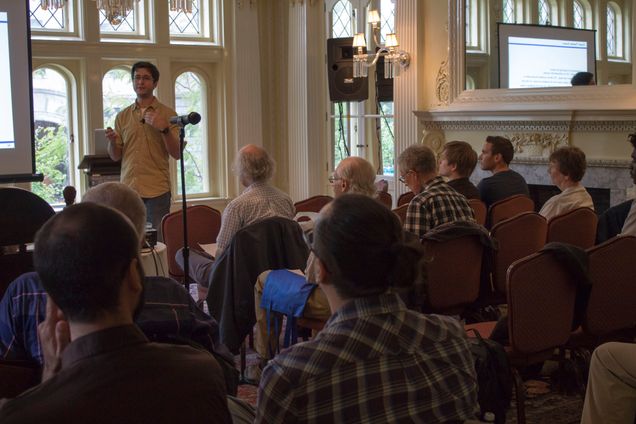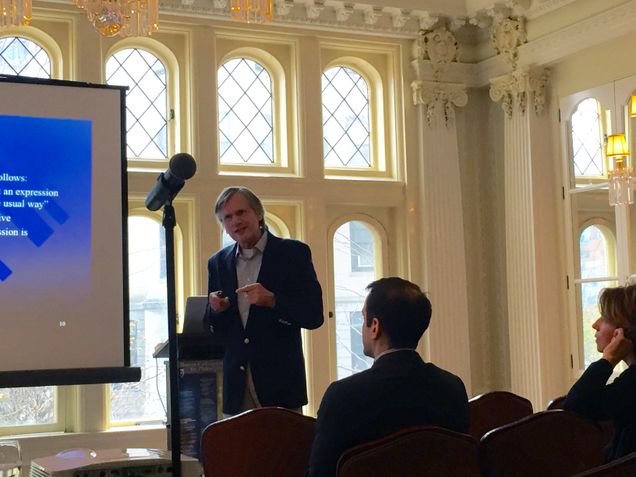Archives 2015-2016
56th Annual Program
2015–2016
The Abner Shimony Forum*
Quantum Mechanics and Modality
Friday, October 9th, 2015, 2pm – 6pm
The Castle, 225 Bay State Rd.

Heisenberg and the Incomplete-ability of Quantum Mechanics
Elise Crull Philosophy, CUNY
| mp3 | Lecture Slides
Exploring a Closed Theory Stance Towards Quantum Mechanics
Nahuel Sznajderhaus CPHS Visiting Fellow andPhilosophy, University of Leeds
| mp3 | Lecture Slides
Lessons from the Minimal Modal Interpretation of Quantum Theory
Jacob Barandes Physics, Harvard University
| mp3
Possibility and Quantum Measurement
Gregg Jaeger Natural Sciences and Mathematics, Boston University
| mp3
* Named in honor of Abner Shimony (1928-2015), Center faculty member, in gratitude for his key contributions to the philosophy of physics and philosophy of science more broadly.
Convergent Minds: The Evolution of Cognitive Complexity
Co-organized with Washington University-St. Louis, Philosophy-Neuroscience-Psychology Program. Sponsored by The John Templeton Foundation, and the Boston University Center for Humanities
Saturday, October 24th, 2015,
Photonics Colloquium Room (906), Photonics Center, 8 St. Mary’s St.

9:00am – 11:00am
-
Introduction to Convergent Minds
Russell Powell Philosophy, Boston University
| mp3
-
The Evolution of Problem Solving Abilites in Mammalian Carnivores
Kay Holekamp Zoology, Michigan State University
| mp3
-
Cetaceans and Primates: Convergent Themes in Cognition
Lori Marino The Kimmela Center for Animal Advocacy, Utah
| mp3 | Lecture Slides
-
Convergent Abstractions: Why Comparative Cognition Isn’t Mechanistic (Enough)
Collin Allen HPSC and Cognitive Science, Indiana University
| mp3
11:15am – 1:00pm
-
‘Raven Politics’: Understanding and Use of Third-party Relations
Thomas Bugnyar Cognitive Ethology, University of Vienna
| mp3
-
Why Might Minds Converge? The Case of the Octopus
Jennifer Mather Psychology, University of Lethbridge
| mp3 | Lecture Slides
-
Convergence on What: Rationality, Reason, or Passion?
Dan McShea Biology, Duke University
| mp3
2:30pm – 3:45pm
-
Smart Moves: Is Behavioral Flexibility Evidence of Cognitive Complexity?
Irina Mikhalevich Philosophy-Neuroscience-Psychology and Philosophy, Washington U.-St. Louis
| mp3 | Lecture Slides
-
What Can Insect Brains Tell Us About How Difficult it is to Evolve Intelligence?
Lars Chitkka Sensory and Behavioral Ecology, Queen Mary University of London
| mp3
4:00pm – 5:30pm
-
The Spoon Lecture ~ Relativity and Anchors in Time
Nicola S. Clayton and Clive A. P. Wilkins Psychology, University of Cambridge, Artist
| mp3
-
Synthetic Commentary
Matt Cartmill Anthropology, Boston University
| mp3 | Lecture Slides
The Robert S. Cohen Forum
Economic Fictions and the Methodology of Positive Economics
Friday, November 13th, 2015 2pm-5pm
The Castle 225 Bay State Rd.
Revisiting Friedman’s F53: Hedging, Popper, and Weber
Paul Hoyningen-Huene Philosophy, Leibniz Universität Hannover & Economics, Universität Zürich
Economics and the Epistemology of ‘As-If’
Peter Spiegler Economics, University of Massachusetts, Amherst
| mp3
Counterfactual Storytelling and Fictional Modeling: Friedman vs. Tobin on the Causation of Nominal Income
Tarja Knuuttila Philosophy, University of South Carolina
| mp3
How Can HPS Contribute to Science Literacy and Citizenship?
Co-Sponsored by the Boston University School of Education and funded by a grant from the NSF
Visit the Conference Website here for more information
Friday February 26th and Saturday 27th, 2016
Photonics Colloquium Room (906)
9th Floor, Photonics Center, 8 St. Mary’s Street
Friday 9:30am – 12:30pm
-
Opening Remarks
Hardin Coleman, Dean of Boston University School of Education
-
Fostering Scientific Literacy through the Development of Epistemic Practices
Gregory Kelly College of Education, Pennsylvania State University
-
What Do We Need to Know about Embryos, and Why it Really Matters?
Jane Maienschein, Center for Biology & Society, Arizona State U. and Marine Biological Lab
-
Teaching Ecological Citizenship and Sustainable Living in the Social Studies Classroom
Jay Shuttleworth College of Education, Long Island University, Brooklyn
Friday 2:00pm – 5:00pm
-
How I Learned to Stop Worrying about Making Little Scientists & Love Persuasion: K-12 Science Literacy
Fouad Abd-El-Khalick College of Education, University of Illinois at Urbana-Champaign
-
Engaging Good Climate Citizens
Andrew Light Philosophy and Public Policy, George Mason University and World Resources Institute
-
Teachers as Moral Agents? The Challenges of Teaching about and for the Environment
Li-Ching Ho School of Education, University of Wisconsin-Madison
Saturday 10:00am – 12:00pm
-
Philosophical Implications of Understanding Citizens as Science Consumers
Rachel A. Ankeny School of Humanities, University of Adelaide
-
Engagement, the Emerging Frontier: Bridging the Divides between Science, Policy, & Citizenship
Mahmud Farooque School for the Future of Innovation in Society, Arizona State University
Saturday 1:30pm – 3:00pm
-
Roundtable Discussion
Michael Matthews, Christine Baron, Yann Benétreau-Dupin, and Luciana Garbayo
The annual Robert S. Cohen Forum is named in honor of the Center’s co-founder and first director.
The Alfred I. Tauber Forum
Race and Epistemic Marginalization in Science
Friday, April 8th, 2016 2pm-6pm
The Castle 225 Bay State Rd.
Considering the Scope of Epistemic Oppression
Kristie Dotson, Philosophy, Michigan State University
| mp3
The Epistemological Dimensions of Structural Racism: Lung Function and Disease in the US & South Africa
Lundy Braun, Africana Studies and Department of Pathology & Laboratory Medicine, Brown University
| mp3 | Lecture Slides
On the Bluntness of the Master’s Tools: Induction and Abduction as Methods of Marginalization
Arianne Shahvisi Medical Ethics and Humanities, Brighton and Sussex Medical School
| mp3 | Lecture Slides
Indigenous Advocacy Movements in Climate Science: Ethical and Epistemic Issues
Kyle Whyte, Philosophy, Michigan State University
| mp3
The annual Alfred I. Tauber Forum on Integrating Scientific Knowledge with Human Needs is named in honor of the Center’s second director.



































